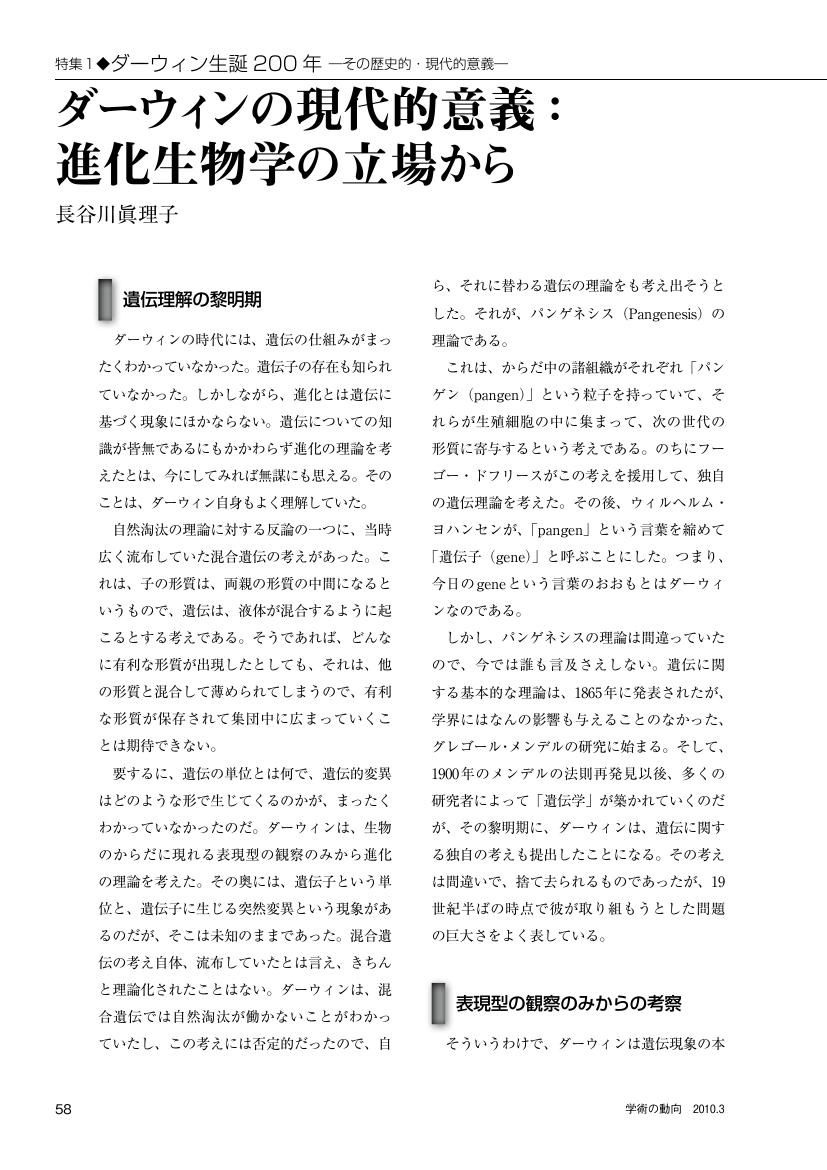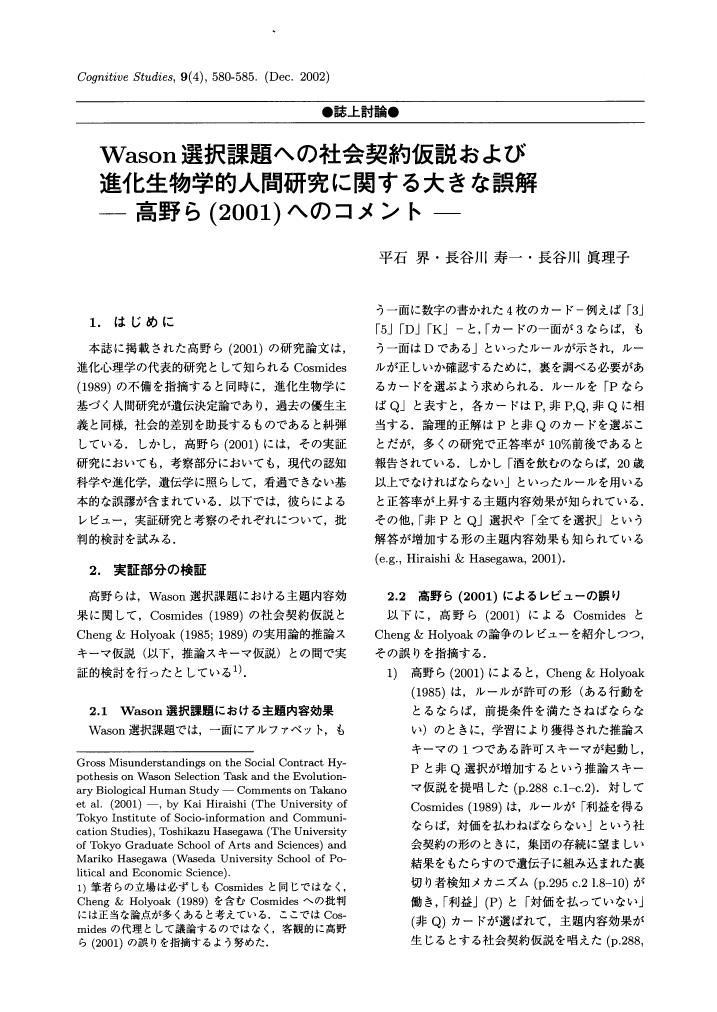1 0 0 0 OA ダーウィンの現代的意義: 進化生物学の立場から
- 著者
- 長谷川 眞理子
- 出版者
- 公益財団法人 日本学術協力財団
- 雑誌
- 学術の動向 (ISSN:13423363)
- 巻号頁・発行日
- vol.15, no.3, pp.3_58-3_61, 2010-03-01 (Released:2010-10-25)
- 参考文献数
- 3
- 被引用文献数
- 1
1 0 0 0 OA 北極探検と北西航路 (<連載5>北極紀行(3))
- 著者
- 長谷川 眞理子
- 出版者
- 一般社団法人 日本生態学会
- 雑誌
- 日本生態学会誌 (ISSN:00215007)
- 巻号頁・発行日
- vol.57, no.2, pp.281-286, 2007-07-31 (Released:2016-09-15)
1 0 0 0 OA 行動の適応と進化 宇宙に進出した人類は?
- 著者
- 長谷川 眞理子
- 出版者
- 日本宇宙生物科学会
- 雑誌
- Biological Sciences in Space (ISSN:09149201)
- 巻号頁・発行日
- vol.19, no.3, pp.186-199, 2005 (Released:2006-03-30)
Human nature is a product of human brain activity, and human brain is an organ which functions to assess environmental information and to make decision about what to do next. Many aspects of human nature must be the results of evolution through natural selection in which favorable genes were selected under the environmental stress. Now, we live in civilized societies based on highly developed technology, using computers, contemplating about the relativity theory, mastering the calculus etc. However, this was not an environment where our basic human nature evolved. That environment was the one which surrounded our ancestors. Humans lived as hunter-gatherers in most of the time during evolution, and the human brain evolved to solve those problems confronted at those times. The resulting decision-making algorithms were so flexible that we can now deal with novel problems of our time using the same old decision-making algorithm. The evolution of behavior is a very complex process and no one gene is controlling any particular behavior. Genes are indeed involved in producing adaptive behavior but a behavior is produced through many other pathways as well, such as learning. We have evolved a huge brain which is capable of producing culture. Culture is a human creation but at the same time, culture has become our environment to which we have to adapt. Thus gene-culture coevolution has been a very important process in human evolution. After we have acquired language, perhaps we have acquired an almost unlimited cognitive power. Many of our cultural invention is the results of our cognitive activity and these things have become parts of our environment. However, cognition is only a small part of the workings of our brain. Human nature is also under control of emotion. Emotional processes are mostly subconscious and have changed little through evolutionary time. In the future, misfits between our cognitive products and emotional process may create many difficult problems which we have never experiences so far.
1 0 0 0 OA 新型コロナウイルスにどう立ち向かうか?
- 著者
- 長谷川 眞理子
- 出版者
- 公益財団法人 日本学術協力財団
- 雑誌
- 学術の動向 (ISSN:13423363)
- 巻号頁・発行日
- vol.25, no.5, pp.5_7-5_8, 2020-05-01 (Released:2020-09-25)
1 0 0 0 OA Wason選択課題への社会契約仮説および進化生物学的人間研究に関する大きな誤解
- 著者
- 長谷川 眞理子
- 出版者
- 日本宗教学会
- 雑誌
- 宗教研究. 別冊 (ISSN:21883858)
- 巻号頁・発行日
- vol.87, pp.17-20, 2014-03-30
1 0 0 0 自然再生事業指針
- 著者
- 松田 裕之 矢原 徹一 竹門 康弘 波田 善夫 長谷川 眞理子 日鷹 一雅 ホーテス シュテファン 角野 康郎 鎌田 麿人 神田 房行 加藤 真 國井 秀伸 向井 宏 村上 興正 中越 信和 中村 太士 中根 周歩 西廣 美穂 西廣 淳 佐藤 利幸 嶋田 正和 塩坂 比奈子 高村 典子 田村 典子 立川 賢一 椿 宜高 津田 智 鷲谷 いづみ
- 出版者
- 日本生態学会
- 雑誌
- 保全生態学研究 (ISSN:13424327)
- 巻号頁・発行日
- vol.10, no.1, pp.63-75, 2005-06-30
- 被引用文献数
- 20
【自然再生事業の対象】自然再生事業にあたっては, 可能な限り, 生態系を構成する以下のすべての要素を対象にすべきである. 1生物種と生育, 生息場所 2群集構造と種間関係 3生態系の機能 4生態系の繋がり 5人と自然との持続的なかかわり 【基本認識の明確化】自然再生事業を計画するにあたっては, 具体的な事業に着手する前に, 以下の項目についてよく検討し, 基本認識を共有すべきである. 6生物相と生態系の現状を科学的に把握し, 事業の必要性を検討する 7放置したときの将来を予測し, 事業の根拠を吟味する 8時間的, 空間的な広がりや風土を考慮して, 保全, 再生すべき生態系の姿を明らかにする 9自然の遷移をどの程度止めるべきかを検討する 【自然再生事業を進めるうえでの原則】自然再生事業を進めるうえでは, 以下の諸原則を遵守すべきである. 10地域の生物を保全する(地域性保全の原則) 11種の多様性を保全する(種多様性保全の原則) 12種の遺伝的変異性の保全に十分に配慮する(変異性保全の原則) 13自然の回復力を活かし, 人為的改変は必要最小限にとどめる(回復力活用の原則) 14事業に関わる多分野の研究者が協働する(諸分野協働の原則) 15伝統的な技術や文化を尊重する(伝統尊重の原則) 16目標の実現可能性を重視する(実現可能性の原則) 【順応的管理の指針】自然再生事業においては, 不確実性に対処するため, 以下の順応的管理などの手法を活用すべきである. 17事業の透明性を確保し, 第3者による評価を行う 18不可逆的な影響に備えて予防原則を用いる 19将来成否が評価できる具体的な目標を定める 20将来予測の不確実性の程度を示す 21管理計画に用いた仮説をモニタリングで検証し, 状態変化に応じて方策を変える 22用いた仮説の誤りが判明した場合, 中止を含めて速やかに是正する 【合意形成と連携の指針】自然再生事業は, 以下のような手続きと体制によって進めるべきである. 23科学者が適切な役割を果たす 24自然再生事業を担う次世代を育てる 25地域の多様な主体の間で相互に信頼関係を築き, 合意をはかる 26より広範な環境を守る取り組みとの連携をはかる
1 0 0 0 OA 生物学の歴史と社会 その基礎となる博物学(Natural History)
- 著者
- 長谷川 眞理子 Mariko HASEGAWA
- 出版者
- 総合研究大学院大学 学融合推進センター
- 雑誌
- 科学と社会2010
- 巻号頁・発行日
- pp.359-380, 2011-03-31
第Ⅲ部 生命科学と社会2009 第2章 生命科学と社会(2)
- 著者
- 長谷川 眞理子
- 出版者
- 日蓮宗宗務院
- 雑誌
- 現代宗教研究 (ISSN:02896974)
- 巻号頁・発行日
- no.39, pp.5-22, 2005-03


